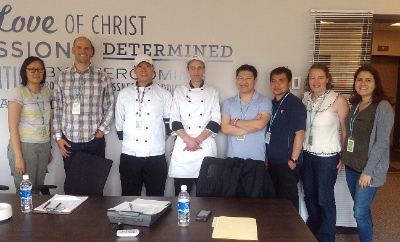
Iron Chefs of the Downtown Eastside, from left: Doris Chow and Darren Stott (DTES Kitchen Tables); Tom Kwan and Randy Spark (UGM); Alvin Chong (Belkin House); Noel Buenavides (Harbour Light); Karen Giesbrecht and Isabela Cravo (Planted).
Here in Vancouver, we have people who have made a career of such a challenge.
Every day a creative, committed crew of cooks make their way to their kitchens in Vancouver’s Downtown Eastside (DTES). They don’t know how many hungry people will show up for the next meal, nor how many guests will be struggling with an addiction, mental illness, the stress of poverty or a trauma that might make their actions unpredictable.
These chefs also don’t always know what ingredients they will have to work with that day. In the world of charitable food programs and food recovery, cooks quickly learn adaptability and resourcefulness as they turn donations of food that may be close to its expiry date into a meal that will nourish some of our most vulnerable neighbours.
Like all large food service operations, these kitchens are exceptionally busy, with only a brief calm between cleaning up one meal and starting the next. The cooks and kitchen managers trouble shoot today’s problems, plan for tomorrow, schedule staff for next week, build relationships with donors so there will be food next month and orient volunteers who were expected to arrive an hour ago. Then, if there is still time, they take a lunch break.
There is no manual on how to run a food program in a neighbourhood as unique as the Downtown Eastside. Mostly, we learn by doing. And we learn from each other.
Several of the head chefs, kitchen managers, dietitians and food advocates from the neighbourhood – including Union Gospel Mission, Belkin House (Salvation Army), First United Community Ministry Society, The Door is Open (Catholic Charities), Harbour Light (Salvation Army), the DTES Kitchen Tables Project and Planted – have been meeting together to share ideas and encourage each other as we move toward more nourishing, dignified and sustainable food programs.
One issue we are working on together is to find best practices before the pending organic waste ban in 2015. Several of the organizations are already composting, but with already stretched budgets, hard decisions must be made between buying more quality protein and funding a compost program.
The City is working to support the charitable food sector, but it will take all of us working together to find systems that work.
Following the rhythms of a community of practice, we are meeting to share lessons we have learned in this unique profession, to encourage each other and to dialogue about the complex challenges we face. We are still working out the details of when and how often we will meet, and what other allies should be at the table with us.
To learn more, contact me at Karen@plantednetwork.ca.
Karen Giesbrecht is a registered dietitian with CityGate Leadership Forum, one of the founding partners of Planted: A Community Food Network, which is helping to cultivate collaboration toward a sustainable and equitable local food system in Metro Vancouver. Within this broader food security network, CityGate nurtures a community of practice for faith-based programs offering a deeper hospitality that moves beyond traditional charity. Karen takes great delight in sharing good meals with her family, friends and those in her community who are hungry.
